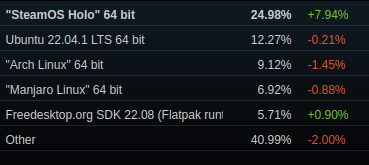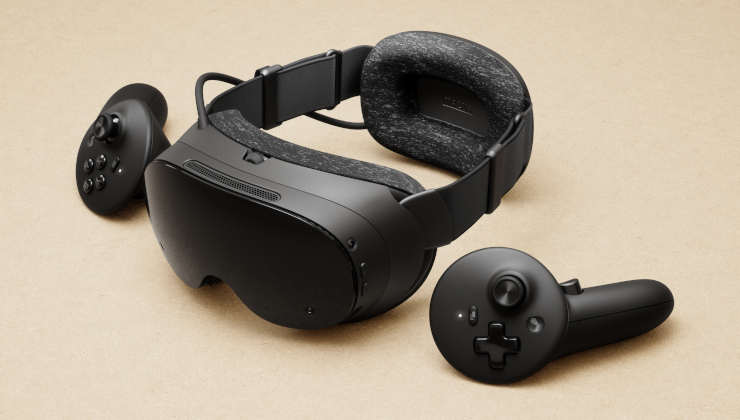Back in 2020 I pointed out what were the best Linux distributions for gaming, so here's the current state and what you should go for in 2023.
The thing is: not a lot has changed since my last article. Linux is still a minefield of many different distributions for people, and it can be very confusing. There's a lot of articles out there recommending really random and outdated distributions in lists too, so here's the real thing.
Without getting bogged down into packaging issues, and just giving you the basics of "this will work just fine" — go and install Ubuntu. People will (and I expect them to) argue for others, and people are free to, but a lot of people suggest other distributions for the wrong reasons. Manjaro has too many problems both technical and management, Arch can and will break things if you don't know exactly what you're doing, Fedora is messy with NVIDIA drivers and SELinux on Fedora is a nuisance and so on. Ubuntu is still to this day, the most simple distribution of Linux to install and get gaming.
Ubuntu isn't perfect by a long shot, but it remains as my number 1 choice to suggest to people both new and old to get into Linux and get gaming. It's one of the most used on desktop by any statistic you can find, which also means troubleshooting it is generally easier too.
With the Ubuntu LTS (long term support) releases, you also get support for at least 5 years, so you don't have the hassle and potential breakage of major system internal updates for quite a long time.
Valve's own stats show Ubuntu as one of the most popular too and it has been the same since Steam came to Linux.
As a user of Fedora myself, take it from me if you're in any way new to Linux: just go with Ubuntu. If you ever decide you "really know Linux now", then you can think about using something else. Don't make it difficult for yourself.
How might this change in future?
Well, Valve are here with the Steam Deck and SteamOS. Eventually, Valve will release SteamOS 3 so anyone can download it and install it. That might end up being a good pick, but right now it's not on the table as it's not released and anyone making their own version of it (like HoloISO and others) are too small to recommend serious use of them.
If you need help and support, specifically for Linux and also Steam Deck gaming, you can try asking in our Forum, Discord, IRC and Telegram.
I moved away from Ubuntu years ago as I want to try rolling release distros, but I really can't say anything bad about it in particular.
Then again SteamOS 3.x is now Arch based also but quite nothing like Arch really.
"What is the best distro for a Linux gaming newbie?"
It is not the answer to the question:
"What is the best distro for gaming?"
I'll let you divine the answer to that question. Let the distro wars commence! (or in this case, continue).
Quoting: CreakOh shoot, just discovered that I actually disabled SELinux a long time ago! I'll try and reactivate it, at least on permissive for nowHaha... that's a good example why SELinux is less secure than AppArmor, it's too complicated that people tend to simply disable it. I used to disable it as well. SELinux is one of the reasons I stay away from Fedora.
But it tends to be kind of old package-wise, and for gaming you want stuff to be a bit fresher, and maybe Ubuntu is a better Linux distribution for gaming because of that. My gaming tends to the light side so I haven't actually had any problems with that kind of stuff, but if I wanted to be even not-particularly-bleeding edge I might.
Quoting: BumadarIf your an nvidia user I agree, it works better out of the box on them.Well only disto I can think of thats not good for an Nvidia user is Holoiso steamos.
If your an amd user then I feel there are more option as you can totally avoid closed source drivers.
I have a pretty slow gaming computer so I have to go for speed to reach 4k or atleast 4k with fsr or the like, so atm I am running ChimeraOS and CachyOS, they are both great for speed in games, ChimerOS is the fastest I have tried, however its a bit too locked down for daily driver usage.
I have not had a lot of issues with Fedora either, just upgraded form 36 to 37, but actually, no tooling for nvidia drivers etc. really makes it a no-choice for new linux users wanting to play games, browse the web and do their work.
I couldn't even use my desktop properly with open drivers yet having an NVidia card, and having to deal with monitor selections and really lagging graphics, if I didn't know the reason I'd have immediately uninstalled it again.
In general, they don't want to know anything about their computer (mobile device), it just needs to function near 100% of the time and be able to "run the apps/games" and "visit the sites" that they want or need. Updates of any form are met with resistance or pure apathy. Good practices regarding data safety or backups are not considered or understood. As a FOSS advocate, I want to help these people have a safe and successful computing experience, but the lack of motivation/desire/understanding I encounter make it near impossible to recommend any Linux distribution.
Honestly, the Steam Deck (SteamOS 3) and Fedora Silverblue gave me a glimmer of hope for the future. Immutable operating systems with dedicated hardware is Linux's best shot to help non-tech savvy people get onto to FOSS platforms. Systems which update themselves, that can be rolled back from bad updates, and abstract applications from core operations are the right direction.
For the rest of us, I don't see that we have to abandon our "full" distributions and our package managers. We just need a Linux offering that can meet people where they are at (then hopefully lead them to a better place). For my own sanity, I would love a Steam Deck in a laptop format that people could just buy off the shelf.
Last edited by Numeric on 1 Dec 2022 at 9:04 pm UTC
Quoting: GuestHmmm. While I agree overall, there's a catch, anyone with a laptop that has integrated graphics+ Nvidia GPU should absolutely install pop os, no questions asked.This! Totally! Tried on many models of MSI laptops (Gaming laptops as much as Quadro Workstations) and since most of them (just not to say all of them) don't have a "discrete graphics" BIOS setting, running anything but Pop_OS! on them is a nightmare. Pop_OS! works ootb, no messing around.
Edit:
It even adds a software switch in the power manager, that actually works:
(Nvidia Graphics <--> Balanced <--> Integrated)
Last edited by Mohandevir on 1 Dec 2022 at 9:38 pm UTC
Quoting: NumericIn general, they don't want to know anything about their computer (mobile device), it just needs to function near 100% of the time and be able to "run the apps/games" and "visit the sites" that they want or need. Updates of any form are met with resistance or pure apathy. Good practices regarding data safety or backups are not considered or understood. As a FOSS advocate, I want to help these people have a safe and successful computing experience, but the lack of motivation/desire/understanding I encounter make it near impossible to recommend any Linux distribution.I don't really get it, to be honest. These are real issues I guess, but what do they have to do with not recommending Linux distributions? I mean, it's not like Windows is nice to work with vis-a-vis updates, or does anything for you in terms of data safety or automagically creating backups without you having to notice. And Linux distros can visit the sites, run the games, and run apps that are generally equivalent (but cheaper) to what they're used to. The more user friendly ones do it with LESS need to fiddle around than Windows. So I mean, assuming you can't actually ban these people from using computers, why shouldn't they do it with Linux?
Y'know, I use Windows at work, but because we have IT people I don't have to administer it. But a few months ago, i bought a basic little computer to attach to the TV, just to surf the web so my wife can watch the news and stuff. It came installed with Windows and, feeling lazy, I initially just left Windows there--why not? Just running a browser. It was a massive pain. Windows is nagware. My wife was constantly calling me over because of some mysterious message that she thought meant something serious but was actually just Windows saying something you can click and forget, for no particular reason except to look vaguely ominous as far as I could tell. Or because they wanted you to switch to fucking Edge. Or because they wanted to know if you really meant it when you set settings to "don't phone home very much" or if you wouldn't rather switch to doing things the Microsoft spy-on-you way. And the updates, argh. Wiped Windows, put in Mint, clear sailing ever since.
Last edited by Purple Library Guy on 1 Dec 2022 at 9:59 pm UTC
Quoting: CatKillerI'm not going to argue for a different distro - the reasons for recommending Ubuntu (sensible release cadence, well-supported, lots of users so lots of available information) are exactly right - but I will suggest a different [flavour of Ubuntu ](https://ubuntu.com/desktop/flavours) since the Ubuntu website does a terrible job of letting people know that that's a thing that exists. The KDE flavour ([Kubuntu](https://kubuntu.org/)) is going to seem more familiar to a new user coming from Windows than vanilla Ubuntu's Gnome. It's all the same software and updates, but using the KDE Plasma desktop environment (like the Deck does) rather than the Gnome desktop environment.Agree with this. For anyone who isn't a complete computer-klutz, KDE is better than Gnome. There is a reason Valve chose it for the Deck.
Quoting: rojimbooUbuntu is the answer to the question:Well, for that question the answer would currently actually be SteamOS on the deck... There was no talk about desktop there.. so using the deck you can use linux for gaming very well without having to know anything about the OS.. no other option is that simple to use.. so you could actually switch from a gameboy (does anyone still know the thing?) or lets say from not having used a complete OS before (Android, iOS, etc. are included here) to steamos on the deck and you should be ready and running in very little time... with any other option you need to know at least a couple of things about computers...
"What is the best distro for a Linux gaming newbie?"
...
for my personal choice (not necessarily newbie friendly): i used suse for a long time ('til some updates completely broke my system and i get completely fed up with it trying to repair it) as it has a lot very nice gui tools for administration (can help former windows users to get acquainted with the system) and now switched to manjaro; pretty much like opensuse tumbleweed, just a different package manager and administration / maintenance access.. and with AUR lots of additional packages that work out of the box...
In gaming both work very well... rolling releases really do a great job in that area, especially when using recent additional hardware and newest games...
for stability, so far I have to say: Manjaro beats openSUSE tumbleweed.
https://nobaraproject.org/
Sorry for the semi-off topic question, but I figured this is somewhat related enough to the article to post it here.
Quoting: AbedsbrotherUsually run RebornOS (Arch) but am currently preparing to give Nobara a try. As time has passed, am less interested in cutting edge and more interested in stability (being a Patient Gamer helps).Good to hear Reborn OS is still around. I was on it a few years ago but was very hesitant to put all my eggs (especially my work laptop) in the basket of a fringe, "one man" distro. When the at the time college aged (I think) founder/dev was openly pondering in the forums about whether he'd be able to keep everything going during his upcoming compsci grad school, I moved on. Is he still the primary driver or is there a larger team?
Anyway, there were always some good ideas at Reborn. Glad to hear it's still going.
Last edited by iiari on 1 Dec 2022 at 10:44 pm UTC
Quoting: rojimbooLet the distro wars commence! (or in this case, continue).

















 How to setup OpenMW for modern Morrowind on Linux / SteamOS and Steam Deck
How to setup OpenMW for modern Morrowind on Linux / SteamOS and Steam Deck How to install Hollow Knight: Silksong mods on Linux, SteamOS and Steam Deck
How to install Hollow Knight: Silksong mods on Linux, SteamOS and Steam Deck